| Srl | Item |
| 1 |
ID:
159366
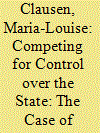

|
|
|
|
|
| Summary/Abstract |
This article argues that the current conflict in Yemen is better understood as a competition over who controls the state, rather than as a conflict between the state and a non-state actor. It traces the development of the Houthis and shows how the movement managed to seize key government institutions. However, the Houthis lack internal legitimacy and have not been able to position themselves as a nationally relevant political elite. The fragmentation of the Yemeni state has resulted in a shift to more localized struggles over access to resources and power that involve both internal and external actors.
|
|
|
|
|
|
|
|
|
|
|
|
|
|
|
|
| 2 |
ID:
179819
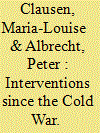

|
|
|
|
|
| Summary/Abstract |
Through the lens of security sector reform, this article explores shifts in international interventions since the Cold War. Identifying three phases, it traces the global North's failure to transform fragile states into liberal democratic polities and changes to intervention practices in response to that failure. Immediately after the Cold War, an unfettered belief in the liberal peace thesis, and its global applicability, drove interventions that sought to establish an integrated liberal internationalist system of states shaped by mutuality. This changed with 9/11, shifting the focus towards extensive statebuilding exercises to replace, by force if necessary, security sectors and reconstruct failed states as liberal democracies. The current phase reflects lost faith in the global North's transformative potential following experiences in Iraq and Afghanistan. New forms of intervention from a distance have emerged, relying on delegation to technology and militaries of the global South. This type of intervention allows the global North to maintain a sense of influence while shifting the burden of intervention onto the global South's populations and militaries—and foreclosing comprehensive statebuilding. The global North can no longer claim to act on behalf of universally applicable norms, but alternatives have yet to materialize, leaving interventions in an ideological limbo.
|
|
|
|
|
|
|
|
|
|
|
|
|
|
|
|
| 3 |
ID:
164824
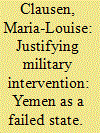

|
|
|
|
|
| Summary/Abstract |
The Saudi-led military intervention into Yemen began on 26 March 2015, and it has largely been supported by the international community despite resulting in the world’s largest current humanitarian disaster. The paper explores the emergence of the failed state concept, particularly as it has impacted the norm of sovereignty. It shows how being defined as a failed state can undermine the norm of sovereignty. This article argues that Saudi Arabia has utilised the failed state concept to legitimise its military intervention into Yemen by framing the intervention as necessary to establish a strong executive power and protect the Yemeni people.
|
|
|
|
|
|
|
|
|
|
|
|
|
|
|
|
| 4 |
ID:
142628
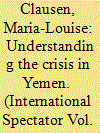

|
|
|
|
|
| Summary/Abstract |
In 2014, Yemen was referred to as one of the success stories of the Arab Spring. Yet, within months a rebel group, the Huthis, took over the capital and the Yemeni state nearly collapsed. Analyses of the crisis in Yemen have routinely reproduced one of three narratives: the Saudi-Iranian proxy war narrative, the sectarian narrative or the al-Qaeda/failed state narrative. However, a closer look shows that the onset of the crisis, although complex, is mainly driven by local factors and related to the lack of political and economic reforms after the transition in Yemen following the uprising in 2011.
|
|
|
|
|
|
|
|
|
|
|
|
|
|
|
|
| 5 |
ID:
191478
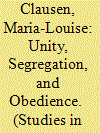

|
|
|
|
|
| Summary/Abstract |
Too little attention has been given to Islamic States efforts to present itself as a more legitimate alternative to the nation-state. This is particularly surprising as IS’ claim to statehood has been a prominent element in IS’ self-branding. This article argues that IS understands itself as a form of political order superior to the state because it is a revival of the caliphate. This argument is made through an investigation of three key dimensions of how Islamic state uses Quranic quotes in Dabiq to undergird this notion of Islamic state as a more legitimate state, namely the need to avoid division (unity), the obligation to avoid disbelievers and fight them (segregation), and the necessity to obey God and by extension, the caliph (obedience).
|
|
|
|
|
|
|
|
|
|
|
|
|
|
|
|